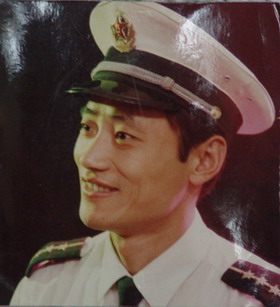Wang, Jun: China should establish mechanisms to pr
|
|
Date: 8/25/2007 10:20:11 AM
Sender: CDP
|
Wang, Jun: China should establish mechanisms to protect ex-servicemen
(Author is CDPWU Chairman)
Published in the "Beijing Spring" magazine in September 2007

Figure 1: Former PLA lieutenant Wang, Jun in military uniform.
An ex-servicemen's social security was the matter of survival
Survival issue for veterans and demobilized officers in mainland China is very serious. Veterans and demobilized military officers petition incidents have occurred often, their unfortunate situation directly affects and shaken the mindsets of the current service officers, and even threatens the continuance of CCP power.CCP also recognize this, and they were forced to start career training for ex-servicemen and demobilized officers, issuing orders "giving priority to ex-servicemen" on job placement. However, Communist China has been "saying one thing and doing another" and the "priority of ex-servicemen" policy becomes purely deception, even "the military placement offices" in the cities are engaged in corruption. The ex-servicemen cannot find suitable jobs unless bribe the officials in the offices. Some were even forcibly sent to the bankrupted companies, unfortunately making them being laid off right after finding a job. Some were forcibly sent to private enterprises without social security. Business owners simply ignore the "policy", they fire people mercilessly.

Figure 2: Photo taken by Wang, Jun working as a journalist in the army
In addition, the Chinese Communist Regime had lost control over local government while focusing on building the economy. Therefore, such policy is only a drop in the bucket, which means nothing. Chinese Communist party dictatorship is lack of social supervision, Chinese society appears to be in chaos, darkness and corruption. Ex-servicemen find no place to redress their grievances, or organization that protects the rights and interests of retired servicemen.
A dull long-term military life and occupational influence of duty-bound obeying orders makes ex-servicemen, especially rural soldiers difficult to adapt to the complex modern society; Long-closed camp preaching and vocational habits formed during strict military training, plus formal education in the army, these made the officers always bear in their minds the national interests and social justice. This resembled great contrast with social trend of bribery and seeking next kin for convenience while doing business. Military employees cannot adjust to local living after demobilization, plus lack of social security, legal protection, and unemployment benefits, they are facing the destiny of losing jobs and failed marriages. Some even died during petition while being arrested or beaten, some even commit suicides.
“The United States guarantee benefits for retired servicemen” is worth studying
In all fairness, the survival issue for veterans and demobilized military officers are not unique to China; the United States also has a similar problem. However, the United States has a government elected by their people; they handle the “Retired Officers” issue very well.
The resettlement of ex-servicemen is related to stability in the military, maintaining the army's combat capability and the maintenance of social stability. All world nations are very serious with this issue. As the No. 1 military super power, the US has maintained good tradition of the resettlement of ex-servicemen. Back in 1944, the United States Congress enacted the "veteran’s bill of rights" to help veterans in World War II to better adapt to civilian life. The basic contents of the Bill are: the United States Congress authorized the federal government to provide medical, health, housing assistance for officers serving more than 90 days in the World War II. The bill also provided financial assistance to US citizens whose educations were interrupted during the war with proper education or career training. The implementation of the bill helped millions of American ex-servicemen, and offered intellectual support and personnel guarantee for US economy transforming from an economy serving the war to serving civilians. For years, US have formed a complete resettlement system for retired ex-servicemen, and many of the experience are worth studying.
According to "The New York Times" report, some American companies in New York launched the annual "Salute to Our Heroes" Employment Seminar to help a smooth transition of ex-servicemen from military to civilian life. They can make contact with some big companies, joined their seminars or resume service. In a recent career seminar in New York, NASA astronaut Dan Burbank said ex-servicemen from US are equipped with many skills that could be used by employers. He said: “ex-servicemen can bring positive forces to the team. Their team spirit, discipline and capability can only be matched by people with similar experience”.
In helping ex-servicemen employment, New York seminar is only part of the job. US government sponsored 3500 employment agencies, providing training and placement for the ex-soldiers as their top priority.
Veterans could also use the "Veterans Act" (G. I. Bill) resources provided, including three years of free college education, free career training or one free one year unemployment compensation.
By the end of 2003, the United States ex-servicemen service targets about 60 million people, accounted for one fourth of the total population. Among them, 27 million are ex-servicemen, and 35 million are ex-servicemen family members. Every year about 20,000 American soldiers withdraw from active duty, which includes 10% officers. US have formed a system led by federal government, aided by local government, participated and supervised by social groups with other department’s cooperation.
Among them, "the United States Department of Veterans Affairs" plays a pivotal role. "The United States Department of Veterans Affairs" is headquartered in Washington D.C. managed by Veterans Health Administration; it is the second largest cabinet-level government body. (To be continued)

"BeiJing Spring" Magazine cover page of Sep. 2007 Edition
(Author of the article is CDPWU Chairman) |
|
| |
